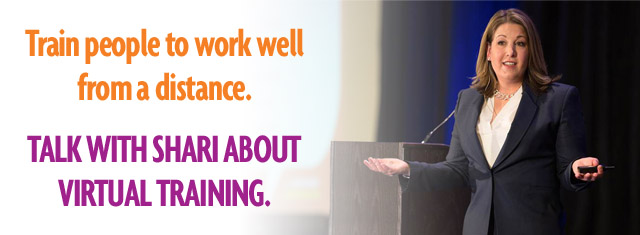Working Remotely – Pick Up the Phone
When I started training managers 20 years ago, I recommended managers meet with their employees weekly for 45-60 minutes. Over time I stopped recommending that because long, weekly meetings didn’t seem feasible and most managers weren’t doing them.
Many managers replaced the weekly one-on-one with the desk-drop-by and team meetings. Managers would tell me, “I talk with my employees daily and have a regular team meeting. I don’t need to do individual one-on-ones. Well, you do now. Employees need to talk to you on a regular basis. It’s time to go old school.
Many employees are still working from home and will be for the next several months, if not indefinitely. Some people love working from home and do it successfully, others hate it and struggle. Whatever you and your employees’ preference for working remotely, people need regular, one-on-one contact.
The questions I’m getting more frequently than any others these days are, “How do I work with others virtually” and “how do I manage remotely?”

Managing Up:
- If you work for a manager who doesn’t reach out much, it’s fine to ask for a phone call. Tell your manager, “I’d like to talk with you individually each week. Can we schedule that? Is it ok to reschedule if we have to cancel?”
- Don’t wait for your manager to ask for an update on your work progress. Send your manager a monthly, bulleted list (or more frequently if she would like) of what you’re working on, what you’re accomplishing, items you’d like help with, and anything else you want her to know. Keep the bullets short and focused. Your manager can use these updates to write your annual review.
Managing Peer Relationships:
- Pick up the phone or have video calls. Either one works. People need contact.
- If you’ve exchanged three emails on one topic, it’s time to pick up the phone. Talking live is quicker, prevents assumptions being made, and preserves relationships.
- Ask how your peers are doing personally and professionally. Most people are struggling in some area. It helps when others care enough to ask how we are doing. But don’t ask just because you think you’re supposed to. If you don’t really want to hear a personal update, don’t ask for it. Just tell people you hope they’re doing well and move on to the business at hand.
- Talk about how you agree to work together from a distance. If could sound like, “How do you want to manage this project? What parts do you want to manage? How should we handle it if we haven’t heard from a team member or if someone is falling behind and missing deadlines?” Talking about how you’ll handle potential breakdowns before they happen is ALWAYS easier than addressing breakdowns after they happen.
- Set agreed-upon deadlines and talk about how you’ll track progress and milestones. You don’t need a manager to do these things.
My main message regarding working virtually is to talk to people more than you think you need to. Pick up the phone. Check-in. Ask how people are doing. Do everything you would do in person, just do it via the phone or video.
Don’t assume people are fine. Don’t assume everything will get done according to your expectation. Pick up the phone and talk about it.



